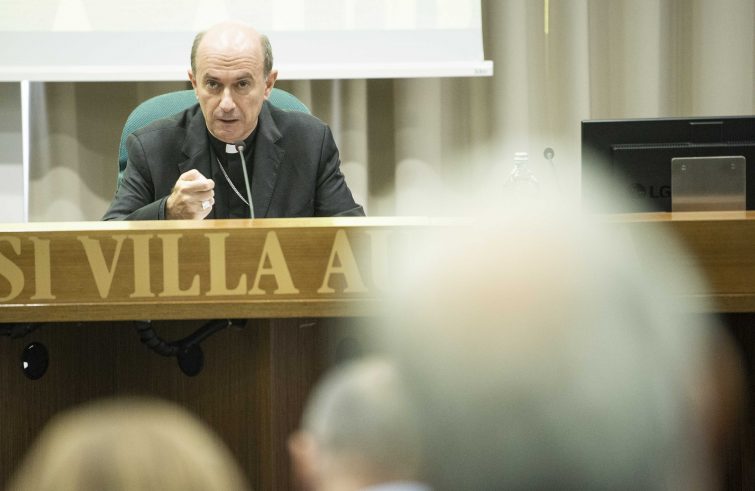
“We are still facing difficult times. The Church wishes to live through these trying times and be close”, said Msgr. Stefano Russo, Secretary General of the Italian Bishops’ Conference (CEI), during the concluding press conference of the Permanent Council of Italian Bishops, held in Rome in the last few days. “Being close to one another”, for Msgr. Russo, is the greatest need that emerged during “the time of isolation” caused by the Coronavirus: “Not only physically, but also before the many difficulties we will be called to face in the future.” The bishops’ invitation is to engage in “an open dialogue”: “We have no pre-constituted solutions but experiences that are filling Church action with meaning and purpose”, as occurred during the lockdown, when the Italian Church “managed to address this ordeal and engage in meaningful activity.” “Interaction, dialogue, in-depth analysis” will be the key words of the next Assembly of the Bishops’ Conference, to be held from 16 to 19 November, during which the prelates will reflect “on the shape the Church might need to take, starting with a process of essentiality” based on the “concrete needs” of people and families and the “creation of bonds of fraternity between people, regardless of their cultural and religious affiliation.” Responding to a question regarding the decision of the Italian Church to create a diocesan Coordination after the meeting in Bari last February, Russo defined the event “a prophetic meeting, fruit of the dialogue of the Holy See.” The prelate said that the Coordination is meant to foster “the continuation of this path, promoted by the Italian Church, representing the different regions of the Mediterranean”, with a view to “a possible meeting in Cyprus or elsewhere.”
“People’s participation is the most relevant factor”.
Msgr. Russo said, answering a question on the recent round of elections for the referendum and the regional elections. “An evaluation of the election result was not on the agenda”, he pointed out: “We agreed on the point – he added – that the turnout was good, which was not at all obvious given the difficulties related to security measures, such as long queues, which made it more complicated to go to the polls.” The recent round of elections, added the Secretary General of the Italian Bishops’ Conference, brought to the fore “people’s yearning to convey their views, even in a difficult time such as this. Therefore, it is up to the “political protagonists” to “acknowledge that people are concerned about the common good, that everyone may have the opportunity to lead a good life, with special care for the poor.” As regards the referendum, for Msgr. Russo, the vote highlighted the need ” to simplify procedures”.
“The fact that Europe is taking action is of great significance”,
Msgr. Russo said, replying to a question on immigration, specifically regarding the proposal to move beyond the Dublin Regulation. “It is a good thing that the issue of the reception of migrants is tackled not only in principle, but with concrete measures”, continued Russo: “The whole of Europe must be involved in the reception of migrants. Amending the Dublin regulation with a view to its improvement is commendable. What’s important is that it remains a process that is brought forth with the willingness to reach agreed solutions.” The Secretary General of the Italian Bishops’ Conference said he values “the statement of principle whereby migrants at sea are to be admitted in any event. Responsible reception is an issue to be explored in depth, as is the proper timeframe for assessing different situations.” Commenting on the proposal to lift sanctions to NGOs rescuing people at sea, Msgr. Russo said: “Also NGOs have an important role to play provided they are acting in the framework of a project and a program, as do all those involved in responsible reception. Whichever deviations have occurred, they are tied to interests that must therefore be tackled and solved, provided that migrant reception is responsibly shared, and not only by the neighbouring Countries”.
“Italy is becoming a country of emigration”.
The cry of alarm was raised by Msgr. Guerino Di Tora, head of the Episcopal Commission for Migration, President of the Migrantes Foundation. “Approximately six million Italian citizens have emigrated abroad in the last 10 years”, said the prelate, “for study purposes and above all for work, as well as for retirement, as did the elderly emigrants to Portugal.” Hence the need to “tackle not only incoming, but also outgoing migration”, effectuated by the Italian Church does with the dedicated Collection “to encourage the activities of Italian chaplaincies abroad.” Msgr. Di Tora noted that the issue of domestic migration is the focus of the World Migrant and Refugee Day, to be held next Sunday, September 27. “The problem of internal migration is underestimated,” said the bishop, who pointed out that ” the estimated number of internal migrants in the world is 50 million, aggravated by the ongoing pandemic, amidst dramatic silence and utter oblivion. “Knowledge and solidarity”: for Msgr. Di Tora these two concepts encompass the response to the challenge of migrations, which require “a new humanism, which is not only a Christian reality, but one that involves global awareness.”












